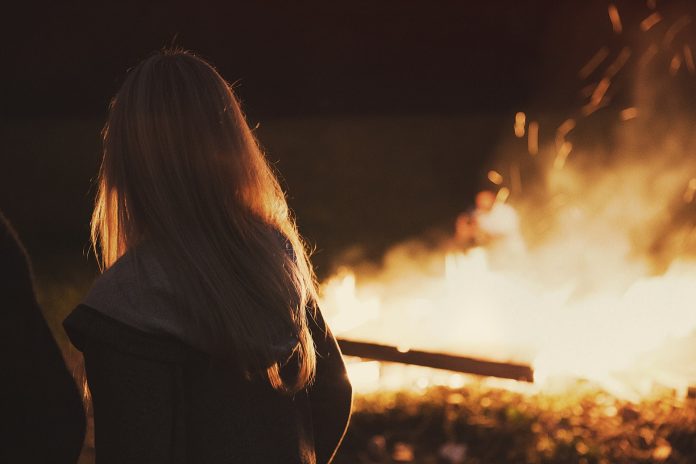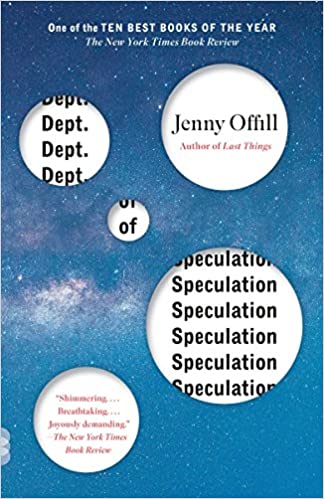By Carrie Friedman
I squint as I read the fine print of the disclaimer that says the campsite is NOT responsible for any coyote, snake, or bear bites or maulings. As I sign our lives away, I say, “This was a mistake,” loud enough for my husband to hear. Our daughters are already running free, up and down the meadow, like they’ve never seen so much open space, possibly because they never have in our crowded Los Angeles suburb. We have arrived at this southern California campsite for a whole weekend of “unstructured fun!” as the parent-email boasted, with other families from our daughters’ school. Our daughters begged us to go this year, so here we all are. “It could just be that you’re not in the right mindset,” my husband, who is one important notch more outdoorsy than I am, says.
He’s not wrong. Only hours earlier, I boarded a plane back to California, from my native Wisconsin. I was visiting my dad, who is in the late stages of dementia and Parkinson’s. Every time I leave him, I know that this could be the last time I see him. This slow-motion loss feels unscalable.
“I’ll be fine,” I say. I want our girls to have this camp experience.
I go to the campsite store and buy a bottle of wine and a bottle of pre-made, pre-mixed margaritas. I start drinking as soon as I find a cup. I drink to blur the edges.
I’ve never been the type of person who drinks in the wilderness, gulping the air like it’s a delicious treat, then says (and means) things like, “I love nature,” or talks about a higher being “creating this masterpiece for us.” But when I inhale the air at the campsite today, I feel a familiar ache. I’m reminded of why I hate camping: it makes me homesick. If the smells of evergreen, mildew, loneliness, and campfire were blended in a bottle, they’d be called Eau de homesickness.
I down a margarita as if I’m a marathoner at a pitstop.
When I was a gawky and overly sensitive 10 year old at summer camp in Wisconsin, my escape was red Kool-Aid that the camp rebranded “Bug Juice.” It was so sweet and concentrated you could chew the sugar granules. I was addicted to the sugar high it gave me: it helped me forget how much I missed my family back home, 90 miles from camp. It helped me feel less awkward around kids I didn’t know. The inevitable crash left me lower than before, sobbing all night in bed while my cabinmates slept. It was a gutting cry, a cry that physically hurt – replaying every fight I’d ever had with my parents or siblings, wishing I were back with them.
My dad, sensing my homesickness, would send funny letters, mailed to arrive by every day’s rest time. I’d read them as I scratched mosquito bites into scabs. His words always made things better.
I drink my way through the first half of the weekend – buzzed, friendly, seemingly carefree – having a drink anytime the ache, or a thought or memory about my dad tries to creep in, like a sad version of a drinking game.
People call this “Glamping” because we are in cabins with indoor bathrooms, not tents and outhouses, but there is nothing “glam” about it. Directly above our bed is what appears to be a hastily made loft with about 20 inches of crawl space and some crib-sized mattresses for our six and seven year old. A rickety metal ladder is propped precariously against a wooden railing that feels like it is as sturdy and well-put together as a shelf I constructed in shop class in third grade. My kids and husband sleep well. I stare at the cedar walls and ceiling all night, trying not to think but thinking nonetheless. If that was the last time I’ll ever see my father, did I say everything I needed to say?
The next morning, I admit to my husband that perhaps the pivot from emotional wilderness into actual wilderness was too much for me. He offers to pack us up and leave early. But the kids are having so much fun, we decide. They have already strapped on their bike helmets and taken off on their scooters with their friends for the morning.
The days are packed and noisy. There’s a hike and a talent show. And smores and drinks with other parents, as our kids don glowstick necklaces and bracelets and chase each other through the woods – streaks of neon as they run past and between the trees.
I buy and drink more wine. In the middle of the final night, dizzy from alcohol, I leap out of bed and vomit in our cabin toilet. As I’m about to flush, I spot a giant brown spider on the handle. I nearly vomit again, but instead scream into a towel, so as not to wake my family.
“I just killed a brown recluse spider in our bathroom,” I tell my husband. He rolls over in bed. I’m not expecting a parade but at least a little gratitude for saving his and our daughters’ lives would be nice.
“Really, Carrie?” he asks, dubious. “A brown recluse, with the violin shape on its back and everything?”
“Yes,” I whisper, a chill running down my spine. “Except it was so big it was more like a cello. This guy could have carried our suitcases. I’m done with camping,” I say.
“Glamping,” my husband corrects.
“I’m going to sleep out in the van.”
I wake up on the third row of seats in the back of the minivan to a blinding sunrise. It’s a new day. My pounding hangover headache feels like a nuisance, a distraction, from the real pain I’ve been trying to avoid. How quickly in the two years since my father’s diagnosis and rapid decline, had my drinking gone from a glass of wine after the kids went to bed to “take the edge off” to “mommy juice at a late afternoon playdate,” to a nightly necessity to numb or push out sadness, which I defended as “self-care.” If this is self-care, it’s not working.
Again, the smells of homesickness fill the air, and I remember things I don’t want to remember.
The letters my dad sent me when I was at camp were a funny serialized mystery he had written, in installments. Each chapter ended on a cliffhanger, and he timed when he mailed them perfectly: I always had a new letter, a new chapter, waiting for me in my cubby every afternoon for resting time. But my camp experience began to improve. I enjoyed horseback riding and canoeing and making lanyard bracelets. When I returned home after camp, my dad discovered his last three envelopes unopened in my suitcase. I tried to explain that I was too tired to read each day. My dad pretended not to care, but I could tell he was hurt.
With this memory, my gulping sobs shake the van.
Suddenly, I am starving. The campsite seems deserted at 7am. I walk to the restaurant/general store. Campfire ashes from the night before float in the air like feathers. My eye makeup presumably everywhere, I imagine I look like a raccoon walking on its hind legs.
I wander through the empty store/restaurant, looking at foods and offerings but not really seeing them. For awhile, I stare without realizing it at a woman making eggs in the kitchen. She has long press-on nails that wrap around the spatula and flip fried eggs and scrape scrambled eggs on the griddle. She has velvety Disney princess eye lashes that must take forever to glue to her eyelids.
I can tell by the way she’s looking at me that my eyes are swollen and red.
“Rough night?” she asks.
“Rough week,” I say. “Rough year.”
“What can I get for you, Hon?” she asks.
Her term of endearment makes me cry again. “Could you make cheesy eggs? They’re just scrambled eggs with cheese on top.”
“Of course, Hon,” she says.
She unwraps and slaps an orange Kraft single on top of the scrambled eggs. It becomes shiny with sweat as it starts to melt.
Cheesy eggs taste like what he used to make on Sundays when we were kids and teens. His variations on the classics, like applesauce pancakes, fried matzo, spaghetti pie, never tasted very good, but now, just thinking of them makes me crave them. The gooey applesauce, somehow still cold, oozed out from the otherwise cooked pancake. The nutty, charred edges of the matzo.
The cook hands me a Styrofoam plate with the eggs covered in cheese, then says, “I’ll ring you up. They’re a dollar fifty.”
Maybe she feels sorry for me and is giving me a discount, I think as I swipe my debit card. Nothing costs so little anymore, let alone a protein.
I sit at a picnic table in the woods, with the yellow scramble. The eggs taste like cheese flavored plastic, just like when my dad made them, and go down easy. Comfort food indeed.
Before I left the last time, he said two things that made sense. I was shocked by the clarity with which he said each, considering he barely speaks anymore and when he does, it’s usually gibberish. He said, “You never give up,” more as a command than a fact, and “I love you so much.” When I was a teenager, I had felt overwhelmed by his belief in me. At that time, I think he loved me more than I loved myself. I felt that way again, but stronger in the thought of losing him.
I can’t swallow anymore because of the lump in my throat. I’m remembering all the things I wanted to say to him, but didn’t, two days ago while I sat with him and held his hand: I’m sorry I didn’t open those last chapters of your story, I’m sorry we made fun of your creative Sunday meals. Thank you for writing those letters, thank you for your food and time and love.
I sit in the pain and really let myself feel it. Sober. At first it feels like I might suffocate, so I take slow, deep breaths while I cry. I cry because I miss my father, and I cry for the moments I have missed with my own children this weekend, blurry from alcohol when they could be sharper, more vibrant in the light of reality: my older daughter singing in the talent show, my younger daughter blowing dandelion fuzz every chance she could, strands of roasted marshmallows sticky on their cheeks.
I decide it’s time to stop multiplying my depressants, so I vow to quit drinking and camping, at least for a while.
“Well,” my husband says as we pack the car, “at least we weren’t mauled by any bears.” I laugh. I breathe in the last of the evergreen, mildew, and campfire smells. I’m relieved to be leaving, but to my surprise the wilderness and the loneliness follow me home.
~~~~~~~~~~~~~~~~~~~~~~~~~~~
Although each of Jenny Offill’s books is great, this is the one we come back to, both to reread and to gift. Funny and thoughtful and true, this little gem moves through the feelings of a betrayed woman in a series of observations. The writing is beautiful, and the structure is intelligent and moving, and well worth a read.
Order the book from Amazon or Bookshop.org
~~~~~~~~~~~~~~~~~~~~~~~~~~~
Anti-racist resources, because silence is not an option
~~~~~~~~~~~~~~~~~~~~~~~~~~~


